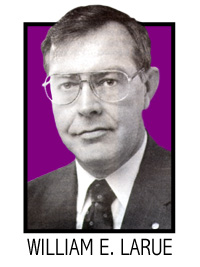 A Voice and a Vote: They Matter A Voice and a Vote: They Matter
For BMWE members and every worker in America, the stakes couldn't
be higher this fall with the close battle for the presidency and the
hotly contested struggle over control of Congress. George Bush or Al
Gore? A Newt Gingrich clone as Speaker or Dick Gephardt? Those are the
choices.
The struggle this fall isn't really about party labels. BMWE
members have a proud tradition of working with politicians in both
parties. But when it comes to the fundamental issues that matter most
- Railroad Retirement, Social Security, rail safety, PEBs, the right
to organize, funding for Amtrak, and stopping rail carrier
intimidation and harassment against whistleblowers - do we want George
Bush or Al Gore sitting in the Oval Office? And who do we want setting
the agenda for the Congress? What we do know is that for railroad
workers, politics matters.
In 1998, the labor movement proved that energized working families,
battling to protect their interests are a potent force that can't be
beaten. In fact, 22 percent of the votes cast came from union
households, meaning that 1 in 2 adults in union households voted. The
labor movement's effort registered half a million additional union
voters and members of their families, sent over 9 million pieces of
mail, placed close to 6 million personal phone calls, and distributed
fliers at several hundred thousand job sites. In the end, extremists
still held on to the House but their anti-working family majority
actually narrowed by five seats instead of widening by 15 to 20, as
predicted by many political "experts."
Clearly, the other side knows that your voice matters in elections.
That is why they want to take away - or at least drown out - that
voice. First, they try drowning us out with money. Business outspent
unions 11-to-1 in the 1998 election cycle, giving $666.6 million to
candidates and parties, while working families, through their unions,
gave $60.8 million.
The other side has also tried taking away our voice by attacking
unions directly. During the second half of the 1990s the labor
movement faced a barrage of proposals from the Gingrich Congress and
at the state level aimed at weakening the ability of unions to educate
and speak out for their members. They threw the kitchen sink at us -
Øpaycheck "deception" proposals disguised as
"campaign finance reform" but intended to silence you in
legislative debates and elections;
Ømeasures to eliminate or water down your labor protections and
collective bargaining rights; and
Øbills to return us to the days of "company unions" whose
leaders were hand picked by the company boss.
Let's be clear about one thing: these proposals have one purpose in
mind - to silence your voice and weaken the BMWE. Fortunately, all
these radical measures and many more went down time and time again,
often thanks to vetoes or threatened vetoes by the Clinton-Gore
Administration.
But while we as a labor movement have succeeded against these
efforts to silence your voice, your voice can only be truly heard if
you use it. And that means in this critical election year, using it at
the voting booth.
We all lead busy lives and the last thing we often need is one more
item to put on our "to do" list. Yet, voting is more than a
thing "to do." It is a cherished freedom and right that our
Founding Fathers gave to us so that we can have a voice in how our
nation is run. And your vote can make a difference - if you are
registered and go to the polls.
Perhaps the best known and most notable example of how one vote can
make a difference is the historical Presidential race in 1960 pitting
then-Vice President Richard Nixon against then-Senator John F.
Kennedy. JFK's margin of victory over Richard Nixon in that race was
less than one vote per precinct!
A more recent, but equally dramatic and important example of how
every vote counts was in the 1996 Congressional race in California
where Loretta Sanchez took on the anti-worker incumbent Bob Dornan.
After a tough fight, Sanchez defeated Dornan and was elected to
Congress by less than four votes per precinct.
And let's look at one other example from the U.S. House of
Representatives where the failure to vote was quite costly. Richard
Baker, an incumbent from Louisiana with only a 9% voting record in
support of working family issues, won his race over his
union-supported opponent by 2,700 votes. Why? Possibly because more
than 7,300 union members in that congressional district were not
registered to vote.
While it is true that the labor movement has made great strides in
getting members out to vote - and is currently conducting a massive
Labor 2000 Voter Registration Campaign - 50 to 55 percent of eligible
union members, and millions more members of union households, are not
registered to vote. Just imagine what could be achieved if these union
members registered and voted.
All indications are that this year's Presidential race will be
extremely tight. And the battle for control over Congress will go down
to the wire. Yet, with the margin of control in the House the smallest
it has been since 1953 and GOP retirements outnumbering those of
Democrats by four to one, the opportunity for us to gain a pro-worker
majority is within reach. But every vote will count. Every vote will
matter. Don't fall into the trap of thinking that one vote can't make
a difference. That's not the BMWE way. If you are not registered, get
to it. And once you are registered, remember to go to the polls on
November 7 - and VOTE!
|

